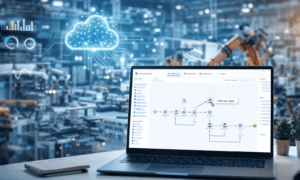In the rapidly evolving landscape of enterprise resource planning (ERP) systems, emerging technologies like artificial intelligence (AI), machine learning (ML), and robotic process automation (RPA) are transforming traditional integration processes. Hari Krishna Reddy Rikkula’s article delves into how these technologies are reshaping ERP integrations, offering a comprehensive overview of their potential benefits and the challenges organizations face in adopting them.
The Current State of ERP Integrations
ERP systems have long been the backbone of organizational operations, integrating business processes into a unified platform. However, traditional ERP integrations often involve complex, manual processes that are time-consuming and error-prone. A consultancy study found that 64% of organizations face significant integration challenges, leading to increased costs and decreased efficiency, with companies spending 5-15% of their ERP budget on integration.
IDC’s survey revealed 72% of organizations struggle with data silos, hindering seamless integration and decision-making. Furthermore, a report by Mint Jutras indicates that ERP implementation, including system integration, typically takes 17 months. This complexity highlights the need for more efficient and automated integration solutions to enhance operational efficiency.
AI and ML in ERP Integrations
AI and ML are revolutionizing ERP integrations by introducing intelligent automation and predictive capabilities. According to Gartner, by 2025, 50% of ERP applications will utilize AI and ML to improve user experience and automate processes. The global AI in ERP market is expected to grow at a compound annual growth rate (CAGR) of 32.5%, reaching $2.9 billion by 2028.
As seen in SAP’s case study, key benefits of AI and ML in ERP integrations include intelligent data mapping, where AI algorithms optimize data configurations, reducing manual effort and improving accuracy by 40%. Predictive maintenance uses ML models to predict system failures, reducing downtime by up to 50% and increasing machine life by 20-40%, according to McKinsey. Natural Language Processing (NLP) enhances user interfaces and chatbots, simplifying integration and improving adoption, with 80% of businesses planning to use chatbots in the coming years.
The Role of RPA in ERP Integrations
RPA transforms ERP integrations by automating repetitive tasks and streamlining data flow between systems. The global RPA market size is projected to reach USD 13.74 billion by 2028, growing at a CAGR of 32.8% from 2021 to 2028.
Key applications of RPA in ERP integrations include automating data migration, where RPA bots handle ETL processes, reducing migration time by up to 70%. According to Ernst & Young, RPA also enhances cross-system reconciliation, improving accuracy in financial reconciliations by up to 95%. Additionally, RPA bots manage API calls and data synchronization between ERP systems and third-party applications, reducing integration complexity.
Challenges and Best Practices
While the benefits of AI, ML, and RPA in ERP integrations are significant, organizations face several adoption challenges. Data quality and governance are crucial, requiring robust data integrity and consistency frameworks. A significant skill gap exists, as specialized skills for these technologies are often lacking in-house, with IBM estimating 120 million workers needing retraining by 2022. Additionally, ensuring security and compliance with regulations like GDPR becomes more challenging as ERP integrations grow more complex and data-driven.
While the benefits of emerging technologies like AI, ML, and RPA are significant, organizations face several challenges in their adoption. Data quality and governance are crucial, as AI and ML models require high-quality, well-governed data to function effectively. Organizations must implement robust data governance frameworks to ensure data integrity and consistency across integrated systems.
Additionally, there is a skill gap, as implementing these technologies in ERP integrations requires specialized skills that may not be readily available in-house. According to a survey by IBM, 120 million workers worldwide will need to be retrained due to AI and automation by 2022. Furthermore, ensuring security and compliance with regulations like GDPR becomes increasingly challenging as ERP integrations become more complex and data-driven.
To conclude, organizations that successfully integrate AI, ML, and RPA into their ERP systems will be well-positioned to gain a competitive edge as the ERP landscape evolves. Hari Krishna Reddy Rikkula believes these technologies enhance operational efficiency and provide the agility and insights needed to thrive in an increasingly digital business environment. The future of ERP integrations lies in the seamless fusion of human expertise and technological capabilities, unlocking new levels of productivity, innovation, and growth.
Read More From Techbullion And Businesnewswire.com



































